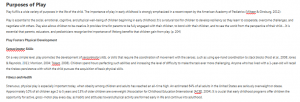Purposes of Play

Play fulfills a wide variety of purposes in the life of the child. The importance of play in early childhood is strongly emphasized in a recent report by the American Academy of Pediatrics (Milteer & Ginsburg, 2012):
Play is essential to the social, emotional, cognitive, and physical well-being of children beginning in early childhood. It is a natural tool for children to develop resiliency as they learn to cooperate, overcome challenges, and negotiate with others. Play also allows children to be creative. It provides time for parents to be fully engaged with their children, to bond with their children, and to see the world from the perspective of their child…. It is essential that parents, educators, and pediatricians recognize the importance of lifelong benefits that children gain from play. (p. 204)
Play Fosters Physical Development
Sensorimotor Skills
On a very simple level, play promotes the development of sensorimotor skills, or skills that require the coordination of movement with the senses, such as using eye-hand coordination to stack blocks (Frost et al., 2008; Jones & Reynolds, 2011; Morrison, 2004; Tokarz, 2008). Children spend hours perfecting such abilities and increasing the level of difficulty to make the task ever more challenging. Anyone who has lived with a 1-year-old will recall the tireless persistence with which the child pursues the acquisition of basic physical skills.
Fitness and Health
Strenuous, physical play is especially important today, when obesity among children and adults has reached an all-time high. An estimated 64% of all adults in the United States are seriously overweight or obese. Approximately 10% of all children age 2 to 5 years and 15% of older children are overweight (Association for Childhood Education International [ACEI], 2004). It is crucial that early childhood programs offer children the opportunity for active, gross-motor play every day, as habits and attitudes toward physical activity are formed early in life and continue into adulthood.